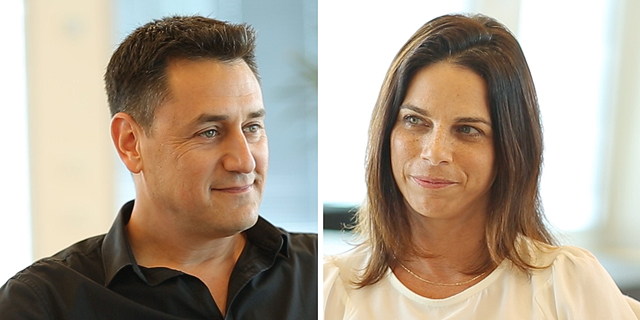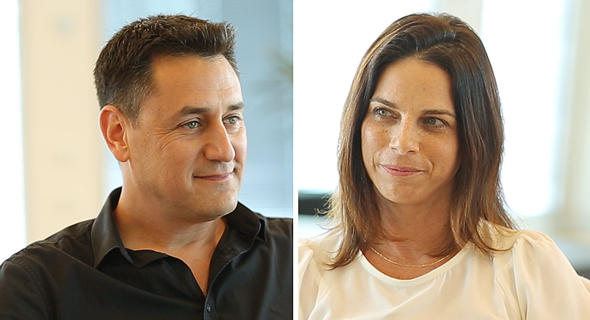
DIY Videos at 1 a.m. and Black Friday-Topping Online Shopping Sprees, Google Execs Describe Our New Lives
Anat Horvitz and Oren Hefetz talk to Calcalist about the shifting search trends brought about by Covid-19
Naomi Zoreff | 16:57, 10.05.20
“The peak times for Google searches are 7 a.m. and eleven p.m., news consumption on Google and YouTube has increased by 10%, and people spend up to 12 hours a day consuming media,” Anat Horvitz, Google Israel’s sector lead for global operations and startups told CTech’s Elihay Vidal last week. Horvitz and Google Israel’s director of export and startups spoke at Google and Calcalist’s Startup Week conference.
“We are seeing lots of searches about coronavirus, both on the search engine and on YouTube, even when compared to traditional leading searches like the weather,” said Horvitz. “People wake up in the morning and immediately start looking for things that happened overnight. They also google Covid-19 last thing before going to bed to see what has changed. We see similar trends on YouTube.”
According to Horvitz, the search topics changed throughout the progression of the pandemic. “In the beginning, people were looking for information about the virus and the disease’s symptoms. As time passed, we saw more searches for regional statistics about the disease, either between countries or among different areas within the same country. Now we are seeing many searches into social distancing-related topics and ways to follow the regulations regarding returning to routine,” she said.
“We are also seeing differences in searches for topics unrelated to the disease,” said Hefetz. “Do it yourself (DIY) searches are skyrocketing: how to bake bread, how to make hummus, and gardening tips, for example. The wellbeing field is expanding and developing, with people trapped within their four walls needing to maintain their physical and mental health. We are seeing a meteoric upsurge in searches related to meditation, home athletics, fitness guides, and all sorts of things you can do at home.”
“The peak time for DIY searches is 1 a.m., said Horvitz. “You can tell that our entire way of life has changed by what goes through people’s minds before they go to sleep in preparation for the next day.
Hefetz added that the same trend could be noticed when it comes to the consumption of podcasts, which people so far mainly listened to while commuting home from work. “People can’t fall asleep and listen to podcasts after midnight. That’s something that entirely changed from a few months ago,” he said.
How can startups or tech companies use that data to leverage their products?
“One of the most interesting things we’re seeing is developments in e-commerce. During March we saw a pretty significant drop in searches for online shopping. But towards the end of the month and even more so in April, we saw a crazy transition, with consumers storming the virtual shelves,” said Hefetz. “It began with shopping for basic goods to avoid the trip to the supermarket and increased after governments in Europe and the U.S. started releasing grants or unemployment payments. As soon as the consumers got their hands on that money, we saw it re-enter the market with April seeing record-breaking trading days, even eclipsing Balck Friday or Cyber Monday sales.“
Fintech is a corollary to e-commerce. What changes did you notice on that front?
“Fintech can be divided into two main topics: individual loans and business solutions,” explained Horvitz. “We saw interesting trends on both fronts, for example, an unprecedented increase in searches for topics related to unemployment and searches for things such as financial saving, remote work, and working with Amazon from home. On the business side, we saw an increase in searches for business loans and insurance.”
Google had to cope with the Covid-19 crisis both as an organization that supports many Israeli startups, and as a direct employer itself. How did you do it?
“Google was one of the first companies to instruct its employees to work from home, so the last time we all met in the offices was before March 10,” Horvitz said. “It was a quick and direct switch from working physically close together in teams and in meetings, to working online and meeting on video calls.”
Are you working more or less than you were before the crisis?
“I think we work the same amount of time, but the traditional divide between work life and home life with family and friends has blurred a lot. These blurred divisions need to be re-thought so we can understand when work time ends and personal and leisure time begins. Their proximity can be confusing,” said Horvitz.
Will you adopt any of the routines you developed over the last few months?
“Without a doubt. We already have a team that is trying to test people’s productivity while working from home and its benefit to their sense of wellbeing. I’m sure it will have an impact. It is just too soon to know what it will be exactly,” said Hefetz.
How do you maintain contact with the startups you support?
“We maintain close, daily ties with the companies. Our accelerator is continuing its activities with the aid of video calls, we hold online conferences, we try to keep in touch even when we can’t meet face-to-face, and we will continue to do so as long as social distancing regulations are in place,” said Hefetz.
“It is now particularly important for us to keep in touch with the startups, who are navigating these uncertain times. The relationship and our ability to provide insights with our search tools and our familiarity with other companies and the industry as a whole is extremely significant,” added Horvitz. “ We are doing a lot to see how we can help them during this turmoil that was imposed on us all.“
